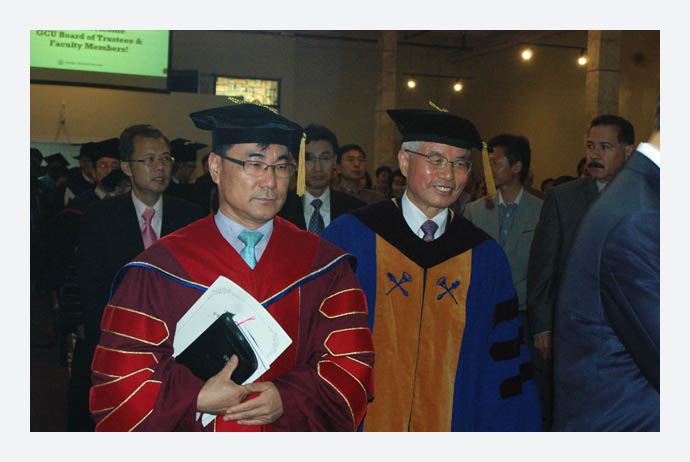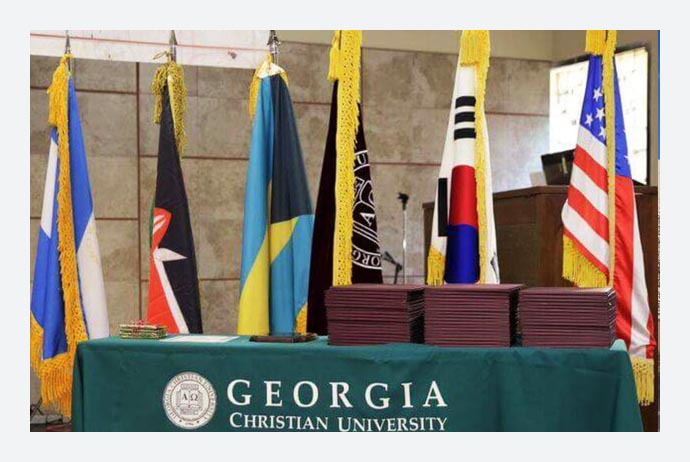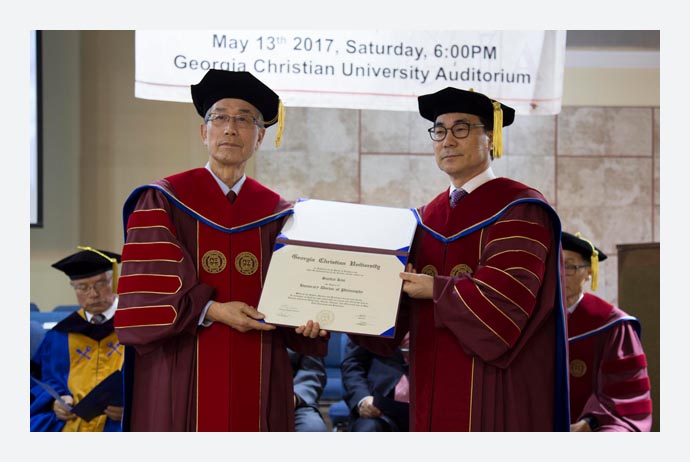In 2003, Georgia Central was authorized by the Georgia Nonpublic Postsecondary Education Commission (GNPEC) to grant non-degree certificates and Bachelor’s, Master’s, and Doctorate degrees. In 2004, Georgia Central University moved to a campus in Lilburn, and expanded the campus in 2005. Also in 2005, GNPEC authorized GCU’s Master of Science degree program in Oriental Medicine.
GCU
Georgia Central University began as the Immanuel Original Bible Institute in Alabama in 1993, focusing on studying Biblical languages and on Biblical interpretation. In 1995, the Institute moved to a new location in Alpharetta, a northern metropolitan area of Atlanta, Georgia, and a new name: Georgia School of Theology. In 2002 the Georgia School of Theology was certified to begin issuing I-20 student visas by the United States Citizenship and Immigration Services (USCIS). In the same year, the Georgia School of Theology and what is now Georgia Central University divided into two separate institutions, the former a religiously exempt school and the latter an authorized university.
- In
2003~2022 -
In 2003~2004
-
In 2009
In 2009, GCU was approved for Candidate Status by TRACS and put forth its best efforts to achieve ever-higher educational goals.
-
In 2011
In 2011, Georgia Central University was granted a provisional certification to participate in the Title IV Federal Student Financial Aid Program by the Atlanta School Participation Team of the US Department of Education. Also, in 2011, GCU acquired and moved to a new campus site at 6789 Peachtree Industrial Blvd., Atlanta, GA 30360, to facilitate growing demand and the need for a new educational environment.
-
In 2012~2013
In 2012, GCU School of Divinity became an associate member school of the Association of Theological Schools (ATS). In November 2012, GCU became a fully-accredited member of TRACS. In 2013, the State Council of Higher Education for Virginia (SCHEV) authorized a GCU teaching site in Virginia.
-
In 2014~2015
In 2014, the School of Divinity was granted candidacy for accredited membership by ATS. In October, GCU installed Dr. Young Ihl Chang, former President of the Presbyterian University and Theological Seminary in Korea, as its second President. The Founder and first President, Dr. Paul C. Kim, was installed as the University Chancellor. In 2015, Dr. Chang resigned his position to concentrate on academic and spiritual matters. Dr. Paul C. Kim was installed as the third President. A new PhD in Intercultural Studies program was approved by GNPEC.
-
In 2016
In January 2016, GCU exchanged a MOU with Africa Theological Seminary in Kitale, Kenya to extend its educational mission in partnering with theological schools in mission fields. In March 2016, GCU was approved to open a teaching site in the State of New Jersey. In May 2016, GCU’s PhD in Intercultural Studies program was approved by TRACS. In August 2016, GCU obtained approval to open a teaching site in Sunnyvale, California.
-
In 2017~2019
In May 2017, GCU was endorsed by the Korean American Presbyterian Church (KAPC). In June 2017, School of Divinity was granted full accreditation from ATS.In July 2017, the State of Georgia and GNPEC approved GCU’s institutional name change request, so the University changed its name to Georgia Central University. The purpose of the institutional name change is to expand God’s kingdom and be more inclusive by going beyond the Christian world. In October 2017, ATS approve GCU’s institutional named change request, so the School of Divinity changed its name to Georgi8a Central University School of Divinity. In November 2017, GCU’s extension site in Hacksack, New Jersey, was approved by ATS. In December 2017, GCU voluntarily withdrew its membership from TRACS. In January 2018, In February 2018, GCU’s Comprehensive Distance Education was approved by ATS. February 2019, GCU Ph.D. program in Intercultural Studies was approved by ATS.
-
In 2021
New Jersey Extension site certified by the USCIS to begin issuing and applying for SEVIS I- 20 visas
-
In 2022
GNPEC authorized two undergraduate Taekwondo Martial Arts Program (AA & BA), In October 2022 ABHE granted Candidate Membership.
-
In 2023
ATS reaffirmed full accreditation till 2030.
In extending its vision of advancement of God’s kingdom through Christian higher education, GCU’s strategic planning has led to reaching out to the world with educational and missionary endeavors in Korea, China, Hong Kong, the Philippines, Nicaragua, Ukraine, and Kenya.
GCU has exchanged Memoranda of Understanding (MOUs) with sister institutions for mutual growth and academic advancement in Korea and other countries, including Honam Theological University & Seminary (2010), Handong Global University (2012), Youngnam Theological University & Seminary (2012), Daejeon Theological University (2012), Seoul Jangshin University (2013), Galilee College in the Bahamas (2013), ATEA Institute for International Studies (2014), Korea Baptist Church Development Board (2014), the Cyber Remote Theological Seminary (2014), and Ukrainian Evangelical Seminary in Kiev, Ukraine (June 2014), and Africa Theological Seminary in Kitale, Kenya (2016).
GCU offers our heartfelt appreciation, glory and praise to our Lord Jesus Christ for establishing and raising Georgia Central University. The history of GCU has seen the rise of Christian leaders armed with a biblical worldview and teaching the Word of God.







